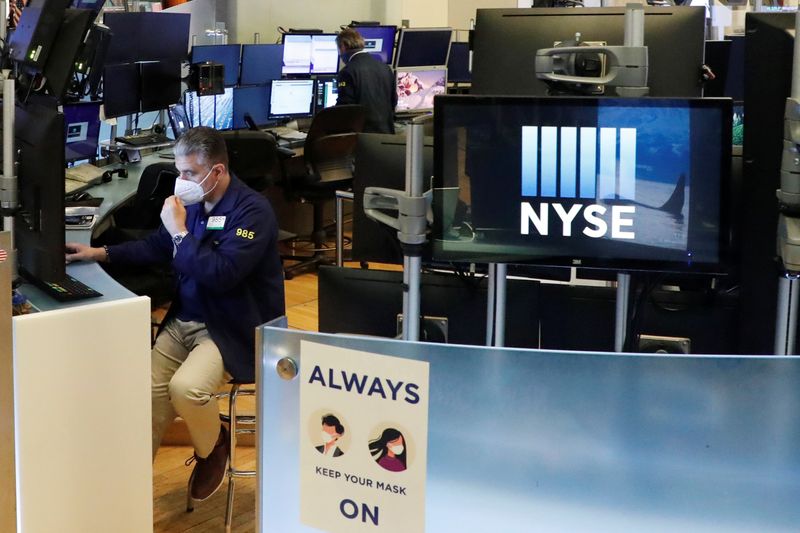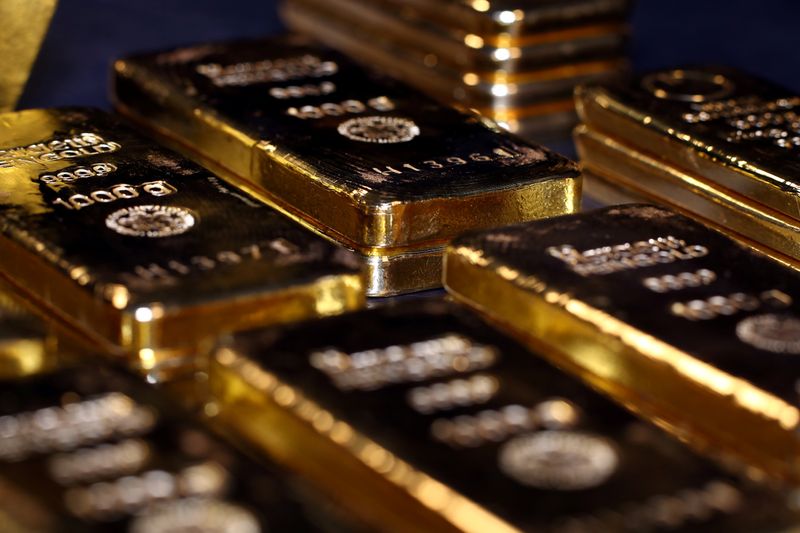By Herbert Lash
NEW YORK (Reuters) - Gold pushed further past $2,000 an ounce on Wednesday in the face of a weak dollar and expectations of more stimulus measures for the pandemic-ravaged global economy, while stocks in Europe and on Wall Street rallied on encouraging corporate earnings.
Oil prices rose to their highest since early March on a big drop in U.S. crude inventories and on the weak dollar, which was pushed lower by data showing euro zone business activity returned to modest growth in July.
The final Composite Purchasing Managers' Index (PMI) from IHS Markit climbed to 54.9 from June's 48.5, better than a 54.8 flash estimate, indicating significant improvement consistent with the continued easing of lockdowns, analysts said.
Gold set a new record after scaling $2,000 for the first time on Tuesday, as investors seek a store of value on fears government stimulus in response to the pandemic will trigger inflation, devalue other assets and keep bond yields low.
Spot gold prices
The dollar standard of the past 50 years is being openly questioned because of the U.S. Federal Reserve's enormous increase in money supply, said Ryan Giannotto, director of research at alternative ETF provider GraniteShares.
"The dollar is collapsing under the weight of $3 trillion in printed dollars, this all comes out in the wash with higher gold prices," Giannotto said.
Gold has gained nearly 35% so far in 2020 and is one of the year's best-performing assets.
(Graphic: Gold versus U.S. yields and dollar, https://fingfx.thomsonreuters.com/gfx/mkt/qzjvqwdrnvx/aug%205%20gol-10yr-dxy.png)
Concerns that the U.S. economy is stalling amid a surge in coronavirus cases has increased calls for more fiscal aid, a move stock investors have welcomed.
But after more than a week of talks and few signs of progress, top Democrats in Congress and White House officials were said to be aiming for a deal to be passed next week.
A surprise quarterly profit from Walt Disney Co (N:DIS) and a slate of upbeat results from healthcare companies lifted sentiment on Wall Street, while European shares rose on a slate of positive results. Disney shares jumped 8.7%.
In Europe, the broad FTSEurofirst 300 index (FTEU3) closed up 0.3% at 1,417.05. London-listed mining groups Rio Tinto (L:RIO), BHP Group
The Dow Jones Industrial Average (DJI) rose 1.2%, the S&P 500 (SPX) gained 0.6% and the Nasdaq Composite (IXIC) added 0.4%, on track for another record close.
MSCI's benchmark for global equity markets rose 0.8% to 563.53, less than 3% from its all-time peak in February. Emerging markets stocks (MSCIEF) rose 1.2%.
The dollar extended losses after U.S. private payrolls growth slowed sharply in July, pointing to a loss of momentum in the labor market and overall economic recovery as new COVID-19 infections spread across the United States.
The ADP (NASDAQ:ADP) National Employment Report showed private payrolls increased by 167,000, far less than an increase of 1.5 million economists polled by Reuters had forecast. U.S. Treasury yields rose after the report, halting their recent trend lower.
"Clearly, we have seen risk appetite rebound on global markets and sort of a return of the theme of a U.S. underperformance relative to world counterparts," said Karl Schamotta, chief market strategist at Cambridge Global Payments in Toronto.
The dollar index (=USD) fell 0.3%, with the euro (EUR=) up 0.5% to $1.1861.
The Japanese yen
The U.S. government bond yield curve steepened as the prospect of increased supply in longer-dated debt dampened prices following the Treasury Department's announcement that it would borrow more this quarter than previously anticipated.
The 10-year U.S. Treasury (US10YT=RR) note rose 2.8 basis points to yield 0.5412%.
Oil prices rose. Brent crude futures settled up 74 cents at $45.17 a barrel, while U.S. crude futures added 49 cents to end at $42.19 a barrel.

(Graphic: Coronavirus and financial markets, https://fingfx.thomsonreuters.com/gfx/mkt/rlgpdngkkpo/GLOB00508.PNG)
